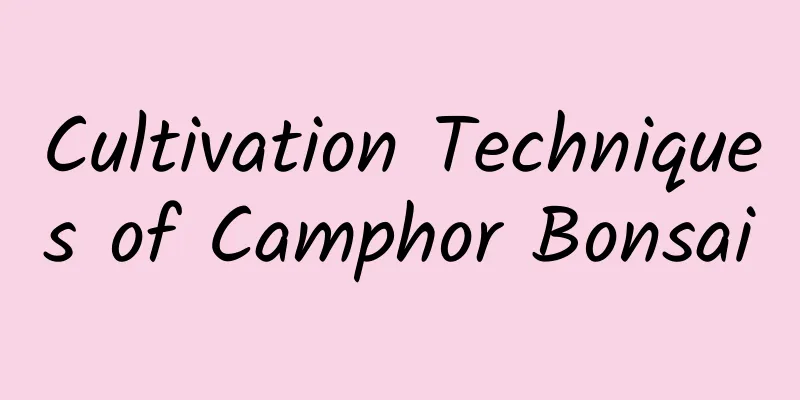Cultivation Techniques of Camphor Bonsai

How to make camphor bonsai1. From March to April every year, before the leaf buds of camphor trees sprout, select 2-3 year old seedlings as raw materials and cultivate them by removing branches and storing stems. 2. Cut off the top of the main branch of the camphor tree, then use a thick iron wire to insert deep into the soil along the base of the plant, and then wrap it tightly around the trunk, and make a series of different bonsai prototypes according to the shape of the tree. 3. From July to August, that is, before midsummer, you can loosen the wire tied in spring, and then use thin wire to shape and tie the new branches that sprouted in the past after the leaves fall in late autumn. 4. From March to April of the second year, take it out before the leaf buds sprout, and plant it in a pot with the soil ball. Soon it will become a camphor bonsai with a simple shape and luxuriant branches and leaves. Cultivation Techniques of Camphor Bonsai1. The depth, length and width of the pit for cultivating camphor bonsai should reach 50~60 cm. The planting depth should be equal to the root diameter of the seedling. When planting, the root protection soil should be closely connected with the hole soil. If the back soil is not tight or false, it will form a hanging shape. 2. Whether you plant camphor bonsai on a cloudy or sunny day, you should water it thoroughly in time to help it take root. In dry or sunny weather, you should water it thoroughly every 7 days or so, and do it 3 to 4 times in a row. Precautions for cultivating camphor bonsaiCamphor bonsai can be grown at home, and of course it can be grown indoors under a sun shed, but not in the living room or bedroom because there is not enough space. However, it can be grown in a large enough sunroom. 1. Use soil Camphor bonsai uses slightly acidic soil to grow. Alkaline soil is not suitable for growing camphor. If planted in alkaline soil, it will easily cause the plant to turn yellow, resulting in the diseased plant's roots being unable to absorb effective iron, and the chlorophyll in the leaves being unable to be synthesized normally, causing the leaves to turn yellow. 2. Pruning It is generally best to prune camphor bonsai before planting, or if there are too many flowers, pruning is also required. This can reduce the consumption of nutrients and ensure normal flowering of the plant. 3. Repotting The best time to repot camphor bonsai is before budding in mid-to-early March. It is not good to do it too early or too late. Too early will easily freeze, and too late will be unsuitable for transplanting the whole bead and cannot meet the plant's growth requirements. 4. Watering The watering of camphor bonsai is generally adjusted according to the season. In summer or drought, it is best to water it once in the morning and evening. In spring and autumn, water it every 1-2 days. In the rainy season or rainy days, no watering is required, and attention should be paid to drainage. |
>>: Ranunculus prefers shade or sun
Recommend
Should Amaryllis have its leaves cut in December (When should all the leaves of Amaryllis be cut)
How to cut the leaves of Amaryllis and to what ex...
Does kale prefer shade or sun?
Does kale prefer shade or sun? Kale is relatively...
The autumn heat is here. If you do these stupid things, your flowers will die immediately!
When watering in the beginning of autumn, don’t w...
Yacon Planting Conditions and Geographical Environment
Yacon Planting Conditions Yacon likes a cool envi...
When is the best time to sow green onions in spring?
Spring onion planting time Green onions are gener...
What fertilizer is best for persimmon trees?
Persimmons are native to China, and there are per...
Why can't you grow flowers in a greenhouse?
1. Can it be raised? Flowers can be grown in a gr...
Can I water the Christmas cactus when it is blooming?
1. Is it possible to water? In fact, you can wate...
How to make Cassia winged pods bloom on New Year's Day
Normal flowering season The normal flowering peri...
When is the best time to use microbial fertilizer (when is the best season to apply biological fertilizer)
Microbial fertilizer refers to a preparation with...
How to grow Anthurium? This way of growing flowers will make them colorful and their leaves bright!
How come Anthurium flowers are so colorful? Gener...
How to plant pepper seeds?
Peppers are primarily propagated by seeds, which ...
How to cultivate the fortune tree
1. Potting soil When cultivating, you should choo...
Do small roses prefer shade or sun?
Do small roses prefer shade or sun? Small roses a...
How to grow lotus and what to pay attention to
Lotus growth habits Lotus is commonly found in ca...









